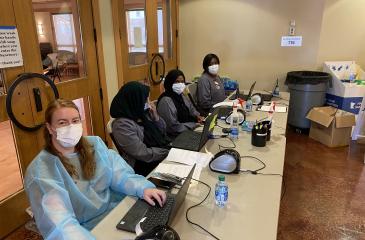In June, a collaborative pilot effort between the Institute for Molecular Virology (IMV), Community-University Health Care Center (CUHCC), and the Mobile Health Initiative took place at the New City Church in Minneapolis and the Center for Asian Pacific Islanders (CAPI USA) in Brooklyn Center.
“This combined effort at the vaccine events provided opportunities to hear the community's perspectives and identify avenues for continued vaccine education and outreach to increase vaccine confidence within the communities we serve,” said Opeyemi Adesida, MBBS, MPH, mobile health director.
The pilot focused on addressing COVID vaccine hesitancy. Individuals were surveyed about their concerns and verbal responses were collected. Approximately 60 people were vaccinated at the events, and over half of those vaccinated offered survey feedback. The responses from the majority of people showed that they had seen misinformation regarding vaccines on social media. Others reported they delayed getting vaccinated because they could not take time off work from their employer if they got side effects. Some stated they were expected to come into work even if they were sick, or they might lose their job. Several female respondents indicated concerns that the vaccine would cause infertility. Many male respondents were the last one in their family to get vaccinated; they preferred to first see what, if any, side effects were observed among family members before deciding to seek vaccination.
There were many people who also reported that they wanted to get the vaccine, but did not know where to find a vaccination event. One person was worried about an elevated risk for adverse reactions and symptoms due to a pre-existing health condition. Some couples staggered vaccination in order to care for children if the other got sick. One mother decided to get vaccinated after she was encouraged by her adult son. High school and middle school respondents were eager to get vaccinated and negative misinformation did not affect their direction of getting the vaccine.
IMV and CUHCC staff offered information regarding the safety and efficacy of vaccines onsite and continue to offer education in person, via social media, and question and answer sessions with providers to increase vaccine education and confidence.
The team is planning more pilot events throughout the summer and are eager to include student volunteers to participate in outreach.
“The participation of virology graduate students in this pilot has provided outstanding career development opportunities in community outreach and engagement, as well as greater awareness and understanding of health disparities,” said Louis Mansky, PhD, director for IMV.



